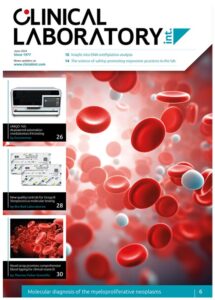Digitization of health
The development of appropriate technical instrumentation for both sample and data analysis in recent years has driven progress in the field of metabolomics. CLI chatted to Dr Ali Tinazli (CEO at lifespin GmbH) to find out more about how this process of ‘digitizing health’ is developing and what it will mean for us as inidviduals.
The development of molecular biology techniques and improvements in DNA sequencing capabilities from the detection of the first disease-causing point mutations through to the sequencing of the human genome and next-generation sequencing has had a big impact on the ability to diagnose, prognose and tailor therapy for disease. We are now in the era of ‘big data’ – what is this going to do for medicine?
Personalized medicine is probably the most important megatrend in healthcare, which emerged as a result of the genomic and IT/computing revolution that started about 30 years ago. Early diagnostics – ideally before the onset of a disease – and personalized treatment choices based on the individual patient characteristics (e.g. genetic profile, phenotype and lifestyle) is expected to improve treatment efficacy and the quality of life of the patients. This will enable clinicians to precisely characterize the disease, to stratify the patients and to select the right treatments adapted to the disease and the patient conditions. Genomics has already provided great contributions to improve the standard of care in current healthcare. Now the time is ripe for new tools complementing genomics and getting even closer to the actual physiological state, providing deeper health insights. For example, many chemical reactions occur in living beings to convert food into energy. The chemical products of metabolism that are needed to do everything from moving, to thinking, to growing are called metabolites. The complete set of metabolites found within a biological sample is the metabolome. Metabolomics is clearly correlated with the functionality of the organism, while the other ‘omics’ such as genomics, transcriptomics and proteomics, are closest to its capabilities. Clinical metabolomics for personalized medicine is probably the most promising application fields. Diseases distinctively impact metabolism causing specific changes in metabolic relationships, i.e. in the presence and quantity of metabolites.
Our proprietary technology platform digitally captures individual metabolomes, i.e. the concentrations of hundreds of metabolites, with a single nuclear magnetic resonance (NMR) spectroscopy measurement (Fig. 1). Using our proprietary method, we have determined the metabolic baseline for human health with digital metabolic profiles of currently more than 130 000 individuals allowing analysis of more than 1 billion metabolic relationship datapoints. We keep continuously increasing the number of individual profiles which will steadily improve the database. The baseline for human health shows significant differences between genders and age groups. That means that two individuals of different age and gender can be completely healthy and show, for example, age-specific characteristics, evidencing that our metabolomes are change over time as we age (Fig. 2). Differences in the metabolome can provide useful insights to differences in drug efficacy among different patient populations.
We can see these difference in the metabolome because of our ability to gather quantitative metabolic information at a much higher resolution than the current state-of-art. Just compare the image quality between analogue TV and 4K digital TV; our algorithm provides a similar enhancement to standard NMR measurement data. Furthermore, our highly sophisticated data science algorithms are constantly searching for disease-specific signatures in the metabolic data. Our database is constantly growing, including patient samples from various fields of disease indication. We can detect distinct alterations in the metabolome caused by diseases. Digital metabolic profiles will enable the early detection of health conditions, staging of disease, monitoring treatment success, and selection of personalized medicine. We have built a strong pipeline of diagnostic candidates in cancer, neurological, and inflammatory diseases. Global scalability will be of utmost importance for worldwide accessibility of new health technology solutions. Hence, our proprietary clinical metabolomics tool will be available to suitable partners from the laboratory, hospital, and pharma industry as a highly scalable software-as-a-service (SaaS) solution.
How will these advances benefit the individual?
Our proprietary solutions can be used to the benefit of patients as well as healthy individuals. We are assessing metabolic profiles, which are dynamic networks, to understand human health. Our platform will allow early disease diagnostics as well as monitoring of flare-ups and staging of diseases. Insights to improve treatment by monitoring response to drugs and side effects will improve individual dosage of medication. Healthy individuals will be enabled to assess health status and unlock health insights to improve lifestyle and wellbeing.
In a real-world scenario, the patient specimen (e.g. plasma/serum or urine) would be directly – without any sample preparation steps – analysed by NMR. Within a few minutes the patient’s metabolome is digitized and processed with the lifespin™Profiler to assess the individual’s general health status. Pathological metabolite signatures will trigger the diagnostics (IVD-as-Software) functionality of the profiler. We are currently developing a prototype which will allow as first step a general cancer screening and as a second step the diagnostics of the organ-specific type of cancer (e.g. breast, rectal, pancreas). Moving forward the lifespin™Profiler will be also used to assess the growth of tumours and treatment response. This functionality will be particularly important for determination of tumour phenotypes. Another real-world example would be the longitudinal monitoring of high-risk individuals for metabolic conditions. A periodic monitoring of, for example, inflammation signatures would prevent worsening of conditions and help to determine the right countermeasures (e.g. change of diet). Ultimately our tool could also be used to provide guidance to individuals, for example, in the context of healthy aging by providing longitudinal metabolic information, which is the most direct way to learn about actual wellbeing and health status.
What kinds of diseases or conditions will (or are) benefitting from this approach?
Our platform technology can address technically all diseases which are linked to metabolism. Currently we have ongoing collaborations and clinical studies in the fields of oncology (including diagnosis of breast, rectal, pancreatic cancer and tumour profiling), neurological diseases [such as multiple sclerosis (MS) and Parkinson’s], and inflammatory diseases (such as arthritis). We are in the process of identifying disease-specific metabolic signatures which can be used for early diagnostics. For example, we have identified very promising metabolic fingerprints that are specific for various types of cancer. A general cancer screening tool and an organspecific multiplex cancer diagnostic test accessible as a SaaS product is a very concrete example of our evolving product portfolio. Another advanced case is our early detection of the beginning of MS. MS is a disease that is very hard to diagnose because of the absence of a specific biomarkers in traditional in vitro diagnostics (IVD). Current standard of care for the diagnosis of MS is a tedious and costly series of different types of tests. In the absence of legacy IVD solutions, we are developing our own proprietary algorithm for the diagnosis of MS based on unique metabolite signatures and are expecting early deployment with select laboratory partners in the next 12–18 months. We have a differentiated regulatory strategy for our commercial roadmap seeking regulatory approval in Europe, the USA and select Asian countries over the next few years.
How is this kind of work done?
Our proprietary platform solution is based on a traditional sample collection front-end and a highly sophisticated data-science-enabled back-end with a digital result output. We can use patient samples such as blood (serum or plasma), urine, saliva, or cerebrospinal fluid (CSF) without sample preparation and add into an NMR test tube.
Metabolites are measured with NMR spectroscopy. NMR sensitivity is lower (micromolar) compared to mass spectrometry (nanomolar); however, it is quantitative, has a higher reproducibility with very short sample preparation time and does not destroy the sample. NMR enables fast measurement, where all metabolites at a detectable concentration can be recorded in one measurement. Mass spectrometry requires different ionization methods to maximize the number of detected metabolites.
At lifespin we have developed a proprietary lifespin™Profiler which allows detection of more than 1000 different metabolites. Our lifespin™Profiler allows processing of NMR metadata in a unique fashion to embrace a large dynamic concentration range. One important aspect of our lifespin™Profiler algorithm is that it eliminates the intrinsic, individual measurement error for each individual metabolite. This allows lifespin a quantitative comparability of metabolites at different metabolic states and, hence, a very precise capture of an individual’s metabolism. We have developed profilers for different types of biological samples, ranging from blood (serum, plasma), urine, saliva and cerebrospinal fluid (CSF). These specific profilers allow optimized quantitation of metabolites typically found in the corresponding sample types. Mass spectrometry cannot deliver this quantitative, digital capture (‘snapshot’) of metabolomes.
Hence, NMR enabled with lifespin’s profiler technology is the only approach (to our knowledge) which allows comprehensive digitization of quantitative, metabolic information.
This kind of work requires the interplay between many disciplines – how do you achieve this and who do you collaborate with?
We have an experienced management team with industry-leading expertise combining excellence in science, technology, business and operations from Fortune 100 companies. More than 70% of our employees have a PhD in mathematics, physics, chemistry, biochemistry or biology and build a strong powerhouse with our excellent lab technicians. Our passion for smarter healthcare solutions is driving us. We also have an outstanding board with members such as the Nobel Laureate in Physiology/Medicine Prof. James Rothman (Sterling Professor of Cell Biology at Yale University, New Haven, CT USA), Dr Trevor Hawkins (Previous Director of the Human Genome Project and since 2020 the Global Head of HP 200A, Palo Alto, CA, USA), Prof. Wieland (Member of the Academia Europea, the National Academy of Sciences Leopoldina, and Honorary Member of the Charité in Berlin, Germany).
With more than 20 active clinical R&D partnerships with leading hospitals and universities in Europe such as the Charité Hospital in Berlin (Germany) we are staying on top of the clinical developments. Since our foundation in 2017 we have been successful to build a very strong team with industry-leading expertise and a very strong partner network.
We also had the privilege to get elected as an inaugural member of the newly formed Industrial Participant Program at the Wyss Institute’s Diagnostics Accelerator, which aims to drive development and commercialization of new diagnostic technologies at Harvard University (Cambridge, MA).
What do you envisage for the future of metabolomic data profiling and disease diagnosis or risk?
The digital transformation is one of the biggest revolutions in mankind, comparable to the invention of the first wheel, Gutenberg’s printing press, or the Internet. We are digitizing systematically the human metabolome and building the health atlas. Our vision is to make personal health status information available at an individual’s fingertip for use in preventative and direct-to-consumer healthcare for healthy individuals – as well as in diagnostics and treatment monitoring for patients and providers.
The interviewee
Ali Tinazli PhD
lifespin GmbH, 93053 Regensburg, Germany
Email: ali.tinazli@lifespin.de
For further information visit lifespin (https://www.lifespin.eu/)




